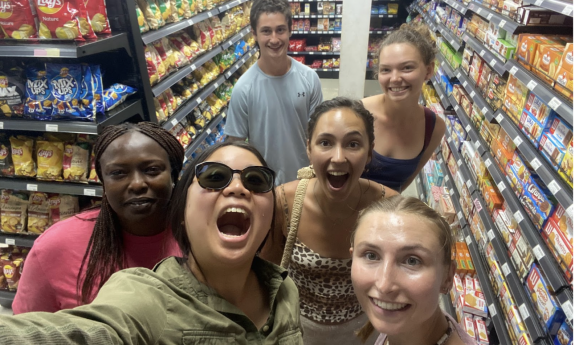Duke Diary Dispatch: Speaking Chinese, and Teaching It, in Togo

Every Wednesday at 9:30, we load into my program director Charlie’s sun-warmed Toyota Highlander: one passenger in front, three in the middle, and two in the trunk, and head to Kara, the regional capital and only city nearby, for a day out on the town. It’s one of the routines we look forward to most here.
A typical Kara day is as follows: We begin by going to a bakery run by nuns, where we buy pastries and mini tubs of local yogurt for a late breakfast or mid-morning snack. Then, we go to a lively commercial wholesale and street vendor district, with our home base at a bar called “Le Chateau” (the castle), where we take turns shopping and guarding each other’s possessions. Then, we go to lunch—the location varies—and finally visit the bustling Grand Marché de Kara in the afternoon, an indeed vast market with a view of a mountain ridge.

Yesterday however, we went to the supermarket for the first time. It’s newly built, so Charlie hadn’t known about it. It was only by catching a glimpse of a road sign that we happened upon this new development of a Western supermarket, a modern bakery with plush seats, and a karaoke house.
Outside, I saw 3 Chinese ladies leaving in a car driven by a local chauffeur. We happily waved at each other, though I noticed I seemed more surprised to see them than they did me. I wondered why as I walked in with my friends, but forgot about it immediately upon seeing our surroundings. We were euphoric. Never had a Western supermarket felt so familiar and welcoming. We stocked up on familiar snacks: I bought brown rice cakes, chocolate Petit Écolier biscuits, soy sauce for my family to try (and for myself to eat with rice). While making my 4th round of the French cookie aisle, I ran into 3 Chinese people browsing the adjacent shelves of chocolate: a young woman and two middle-aged men.
“你好,” (nǐ hǎo, hello) we said to each other. My eyes must have been bulging out of my skull with surprise. Again, they seemed delighted to see me, but not at all shocked. I remembered children in the village telling me that they had seen Chinese people in Togo before, that they built roads and infrastructure. We began a conversation: “Who are you? Where are you from? Why are you here?”
They all worked at a hospital in Kara, though I wasn’t able to understand whether an NGO or the Chinese government had dispatched them to northern Togo. (It might also have been a Chinese public-private partnership that had done so). The two men were doctors, one an acupuncturist, the other a surgeon, and the young woman seemed to be a jack-of-all trades, a coordinator for the medical team. I explained in a mix of Chinese, French, and English (the young woman spoke all three), that I was a student at Duke University in the United States with a cultural exchange and service program called DukeEngage; the program director was a cultural anthropology professor and longtime researcher of a village in the region, I told them.
I specifically taught Mandarin and creative writing classes in my village, Farendé. The local kids had an incredible knack for the language, I proudly recounted. They picked up words quickly and repeated them after me with stellar pronunciation — pronunciation that rendered me slack-jawed during the first lesson I taught. I had never heard American kids pronounce Chinese so well. But Kabiye, the language of northern Togo, is tonal, like Mandarin: pitch can completely change the meaning of otherwise identical consonants and vowels, whereas this tonality is absent from Western languages.

A few weeks later, I ran into the three people again, along with their entire 20-person medical team, at a restaurant in Kara, where I chatted with their colleagues a bit, very conscious of my non-fluency in Mandarin. I felt sheepish telling them that I was teaching Chinese when I struggled to communicate anything more than basic information—but they, always generous, said my Chinese was quite good, especially for an ABC, American-born Chinese. (They were definitely being polite.)
One of the doctors also pointed to their appetizers, asking me if I wanted to sit down and join them. (I think that was out of genuine warmth and the delight of seeing a similar face.) Of course, I declined because I was already eating with my DukeEngage group. But I had an ulterior motive: I would feel clueless and borderline illiterate sitting among them because my Chinese is about the same level as that of a native elementary schooler. Somehow, it’s worse when you understand some of the language: it’s possible to pick out words and, with great effort, make sense of a conversation, but the whole time it feels like tissue is covering your eyes.

Clarity and understanding feel close but just out of reach. It doesn’t help that as the child of Chinese immigrants, I feel like I ought to know the language. I never felt bad when understanding nothing in the midst of a Kabiye conversation, for example.
At least I had the basics of Mandarin down and the curious excitement on my Kabiye kids’ faces to motivate me. Every time they recalled a word correctly, my heart seemed to fly. I hope it will stick with them, but I’m just grateful I got to expose them to something new and stimulating. And teaching in Togo exercised my tongues, too: my French went back to being fluent, and my limited Chinese didn't get rusty. I know because since I got home, my mom hasn’t said anything about me forgetting my Chinese!
And unlike those polite doctors, she’s brutally honest.